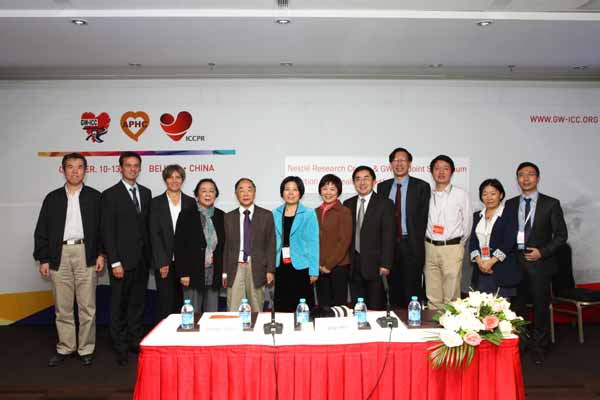


The 24th Great Wall International Congress of Cardiology (GW-ICC) and Asia Pacific Heart Congress (APHC) 2013 are now being held in Beijing. In collaboration with these important events, the Nestlé Research Centre Beijing has organized a joint Symposium together with GW-ICC. The Symposium focuses on the nutritional approaches for cardiovascular and metabolic health. Additionally, a Nutrition and Health Workshop will be organized together with Nestlé China during which nutrition training will be provided to physicians.
The keynote symposium speaker, Prof. Philip Yu-An Ding from Cardinal Tien Hospital, Fu Jen Catholic University, Taipei, will speak on "Nutrition Modification for the Prevention of Cardiovascular Disease". The talk will describe how nutrition can contribute in a sustainable way to both cardiovascular and metabolic health.
It was recently estimated that 11.6% of Chinese adults are diabetic and 50.1% pre-diabetic. Therefore, the early detection and treatment of patients at-risk are key strategies in the prevention of Type 2 diabetes and cardiovascular disease (CVD). Nestlé Research aims to provide scientifically proven nutritional and behavioural solutions to improve metabolic health by either reducing the risk of developing chronic diseases or by helping to manage these conditions. In this context, Dr. Katherine Macé, Head of Nestlé Research Center's Nutrition & Health Research, will present a summary of Nestlé's research on the beneficial effects of 1) sebacic acid on glycemic control and 2) coffee consumption on lipid oxidation and insulin sensitivity.
Lastly, Prof. Cuiqing Chang from the Institute of Sports Medicine, Peking University, will introduce the concept of < Cardiovascular Health Nutrition Prescription Consensus>, which gives specifications of cardiovascular medical nutrition therapy and provides advice to clinicians, clinical dietitians, nurses and other health care specialists. The aim of this approach is to better implement therapeutic medical nutrition and lifestyle changes into the clinical management and prevention of CVD. The Cardiovascular Health Nutrition Prescription Consensus is led by the China Committee of Cardio-Cerebral-Vascular Diseases of Gerontological Society of China, the Cardiovascular Rehabilitation Branch of the Chinese Association of Rehabilitation Medicine (CRB-CARM), the Chinese Nutrition Society Institute of Clinical Nutrition, and China Preventive Medicine Association Chronic Disease Prevention and Control Branch.
Dietary modification is of great importance in cardiovascular and metabolic disease prevention and is a complement to a therapeutic regimen. Maintaining a healthy lifestyle can help reduce disease risk factors such as hypertension, hyperlipidemia and hyperglycemia.
Nestlé has the world's largest food and nutrition research organization, with about 5,000 people involved in R&D, as well as corporate venture funds and research partnerships with business partners and universities. This global R&D network has two key objectives: promoting people's health through food and beverages and finding solutions to help them manage chronic diseases. The Nestlé Research Center and its extensive network of external alliances, is a leading research entity in food, nutrition and life sciences and is at the core of fundamental scientific research within Nestlé's global R&D network.
In line with its commitment to enhance the quality of people's lives, Nestlé also actively promotes healthier lifestyles, nutrition and dietary information through academic exchange and education such as the sponsorship of workshops, symposia, scientific publications, educational materials and scholarships.
Background:
Cardiovascular and metabolic diseases
China's ageing population is growing rapidly, and CVD has become a major threat to the ageing population's health. The prevalence of CVD risk factors, including hypertension, hyperlipidemia, Type 2 diabetes and obesity, have significantly increased in China in recent years. According to "China Cardiovascular Disease Report 2012", the prevalence of cardiovascular disease in China is continually rising. Approximately 290 million Chinese are suffering from cardiovascular disease, which means for every 10 adults will have two people with cardiovascular disease. About 3.5 million people each year die from cardiovascular disease, around 41% of total cause of death, ranking as top one in various diseases.The 2002 Chinese National Nutrition and Health Survey determined that 160 million Chinese adults suffer from hypertension and another 160 million from hyperlipidemia. In addition, 92 million Chinese adults are estimated to be diabetic, and another 148 million pre-diabetic, of which only 25% are diagnosed. These non-communicable diseases have a significant impact on families, public health resources, and social-economic development and stability.